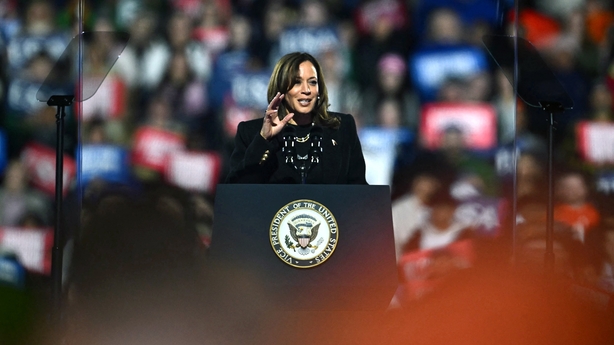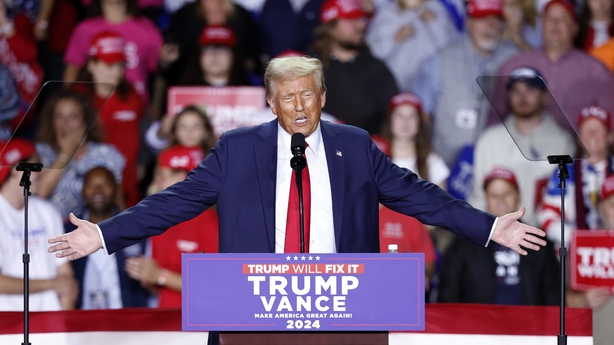So here it is - at last. Judgement day in American politics. The day 'We the People' have their say - irrevocably setting their nation on a new path, much of the rest of the world dragged along in its gravitational pull.
This state-nation, born in revolution, once again stands at a revolutionary moment - which will be sanctioned by the will of the people in a democratic election.
The awesome power of that, too often taken for granted in our own democracy, stands in contradiction not only to the dictators and autocrats of the world today, but to the relationship between ruler and ruled throughout most of human history as well.
Is it taken for granted here? Will it be used carelessly, or with great thought and deliberation?
There is a small but significant revolution ahead if Kamala Harris wins this election - she would be the first woman to hold the highest office in the American Republic.
That will change things - or at least the perception of things - a shattering of the greatest glass ceiling in this superpower. That change has meaning not just for women, and men, in this country, but around the world as well.

The return of Donald Trump to the White House would also be a revolutionary moment, but one that may bring with it more of the disruptive impacts more traditionally associated with revolutions.
His programme hints at, but does not elaborate on, sweeping change brought about very quickly: ending wars within days of the election, imposing huge tariffs on all US imports, mass deportations and ending inflation.
Certainly, there is an appetite for some measure of sweeping change in this country, and a good part of the electorate - 47% maybe 48% - who see Trump as the agent of that change.
That appears to be the secret of his appeal, despite, or perhaps because, of his completely unorthodox approach to politics, political communication, and conduct in public life.
But now it's time for the American people to make their minds up and make a choice. Or more correctly, the 60% of the electorate who have not voted yet.
A remarkable 78.6 million people had voted by yesterday evening in early and postal voting in states that allow it. That's a 39% turnout before election day.
Read more:
Latest US Election stories
Live: Updates as they happen
Most of the political activity in the past two weeks has been aimed not at persuading people to vote for one candidate over the other, but simply to vote.
Minds were largely made up by the end of September. The latter stages of the campaign have all been about getting the vote out to the maximum extent possible.
The polling has pointed to an extremely close, if not drawn race. But opinion polling has become a much less accurate predictor of voting behaviour in recent decades for a host of reasons.
In the last two presidential elections, the polls underestimated Trump support by about four percentage points, resulting in a surprise win in 2016, and a surprisingly narrow defeat in 2020.
If the same pattern holds this time, then Trump looks like the winner.
Or the methodology may have corrected past mistakes and is now accurately gauging Trump's support level.
But perhaps it is underestimating the support Harris has. Anecdotal "evidence" suggests some women are saying things in public, and to pollsters, that may not hold true in the secrecy of the polling booth.
In this interpretation, there is a "hidden boost" for Harris waiting to emerge when the votes are counted, a boost from women voters repulsed by Trump's personal behaviour and opposed to the Dobbs decision in the US Supreme Court, and all that flows (or might flow) from it.

Or perhaps the polls are absolutely bang on - they really are heading for a draw. It's unlikely, but not impossible.
There is even a procedure for dealing with a situation in which both candidates finish up with 269 votes each in the Electoral College - the new Congress decides, with the House of Representatives picking the President, and the Senate picking the Vice-President.
It might be easier than having an extremely close election in which one candidate or another wins by the narrowest of margins.
If Trump loses, the chances of litigation are extremely high. The chances of civil unrest or agitation are sufficiently high already for security agencies to warn of the consequences for those that may contemplate it (the harsh sentences handed out to some of the 6 January rioters is an example: The Philadelphia DA's "F- around and find out" warning yesterday another).
The result will be what it will be. Another day and we will have a pretty clear idea. Or at the very least some hard data on which to form opinions. For now, it's all just speculation and conjecture.
Interest in the result worldwide is intense. The future conduct of the wars in Ukraine and the Middle East will be greatly influenced by what decision the American people make today.
The economic consequences of the election, both long and short run may be profound, particularly the long run consequences in energy, trade and industrial policy.
Globalisation may stop, if not go into reverse. Plans for dealing with climate change may alter radically.
Individual countries and multilateral institutions will have to recalibrate their policies and take the result of this election into consideration: the only question is how big the resulting change will be.
No wonder there is such a sense of anxiety surrounding this political decision that the American people are taking today.
We will all be affected by the outcome, to a greater or lesser extent. But affected we will be.






